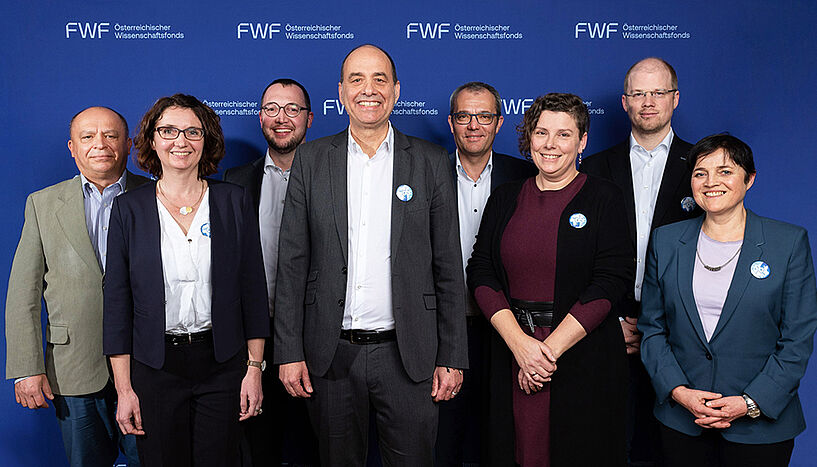
Board of Directors des Clusters of Excellence "Microbiomes Drive Planetary Health" (l.t.r.): Univ.-Prof. Dr. Leonid Sazanov (IST Austria, Faculty of Biochemistry); Assoz.-Prof.in Mag.a Dr.in Christina Kaiser (Universität Wien, CeMESS); Univ.-Prof. Dr. med. univ. PhD Alexander Moschen (JKU Linz, Faculty of Medicine); Univ. -Prof. Dr. rer.nat. Dr. H.C. Michael Wagner (Universität Wien, CeMESS); Univ.-Prof. Dipl.-Ing. Dr. techn. Bernhard Lendl (TU Wien, Faculty of Technical Chemistry); Univ.-Prof.in Dr.in habil.rer.nat. Christine Moissl-Eichinger (MedUni Graz, Diagnostic and Research Center for Molecular Biomedicine); Univ.-Prof. Dr. Alexander Bergthaler (ÖAW, CeMM); Priv.Doz.in DI Dr.in Angela Sessitsch (AIT, Center for Health & Bioresources)
Also in all other clusters the University of Vienna has a prominent position
30 researchers led by the University of Vienna microbiologist Michael Wagner are pooling their competences in a Cluster of Excellence by the Austrian Science Fund Together, they aim to understand how microbiomes - specific communities of tiny microorganisms - regulate planetary health. With their ambitious project, the team was able to succeed in the competitive excellence programme of the Austrian Science Fund (FWF). Numerous academics from the University of Vienna are also contributing to the other four approved clusters by the TU Wien, the University of Innsbruck, the Austrian Academy of Sciences and CEU.
"Today is a great day. The Clusters of Excellence are reflecting the breadth of excellent research at the University of Vienna. The participation of the University of Vienna in all five approved clusters highlight the research achievements by our academics beyond the university. The team led by Michael Wagner additionally serves as an impressive example for how basic research, excellence and societal relevance can find common ground and chime together. My sincere congratulations to all participating researchers on these excellent and prestigious flagship projects", says Rector Sebastian Schütze.
Microbiomes for a sustainable future
"With our Cluster of Excellence, we are creating entirely new synergies by dissolving the boundaries between red and green microbiome research in Austria and, thus, linking medicine and environmental research directly. We want to learn to understand the basic principles of microbiomes to, then, strengthen planetary health by modelling and influencing them in a targeted way," explains Michael Wagner, project leader of the new Cluster of Excellence of Microbiomes Drive Planetary Health. In addition to Michael Wagner and Christina Kaiser in the Board of Directors, 16 others academics from the University of Vienna are joining as Key Researchers: David Berry, Thomas Böttcher, Holger Daims, Thilo Hofmann, Matthias Horn, Stephan Krämer, Alexander Loy, Kristina Djinovic-Carugo, Petra Pjevac, Jillian Petersen, Martin F. Polz, Thomas Rattei, Wolfgang Wanek, Dagmar Woebken, Katharina Kitzinger and Isabella Wagner. The University of Vienna cooperates in the platform with the Austrian Institute of Technology (AIT), the Institute of Science and Technology Austria (ISTA), the Medical University of Graz, the Austrian Academy of Sciences with the Research Center for Molecular Medicine (CeMM), the TU Vienna and the Johannes Kepler University Linz. Also the Natural History Museum Vienna is joining the endeavour (as associated partner).
Microorganisms as health engine of our planet
Microbiomes, communities of microorganisms occupying all ecosystems and living beings, are crucial for the health of our planet and its inhabitants. In this Cluster of Excellence, 30 academics from different disciplines and seven research institutions are aiming at decrypting the common basic principles of environmental and human microbiomes. The aim is to understand how microbiomes are controlling the health of our planet. Based on this knowledge, we can better predict global change and influence microbiomes in a targeted way to find innovative solutions for a more sustainable future.
Learn more about Michael Wagner and his research on the role of microorganisms in the global nitrogen cycle in our research magazine Rudolphina: Research for the next nitrogen revolution
Participation of the University of Vienna in other Cluster projects:
• In the Quantum Science Austria Cluster by the University of Innsbruck, Markus Aspelmeyer from the Faculty of Physics is member of the Board of Directors.
• In the Materials for Energy Conversion & Storage Cluster by the TU Wien, Leticia Gonzalez from the Faculty of Chemistry is on the Board of Directors.
• In the EurAsian Transformation Cluster by the Austrian Academy of Sciences led by Claudia Rapp from the Faculty of Historical and Cultural Studies, the expert on Eastern Asia Jens Oliver Schmitt and linguist Melanie Malzahn are part of the Board of Directors.
• In the Knowledge in Crisis Cluster by the CEU, Hans Bernhard Schmid, Paulina Sliwa and Max Kölbel from the Department of Philosophy are joining the Board of Directors.






